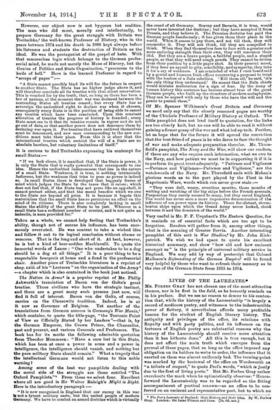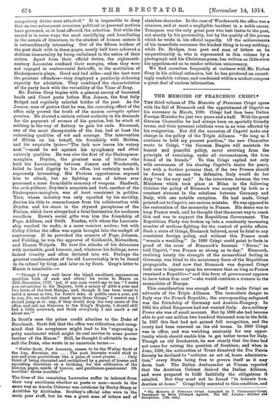LIVES OF THE LAUREATES.*
MR. FORBES GRAY has not chosen one of the most attractive themes, nor is be first in the field, as he honestly reminds us in his preface. But we see no reason to demur to his conten- tion that, while the history of the Laureateship ".is largely a record of mediocre poetry, and witnesses to the indestructible power of flattery, it nevertheless affords many profitable lessons for the student of English literary history. The antiquity and privileges of the office, its relations with Royalty and with party politics, and its influence on the fortunes of English poetry are substantial reasons why the history of the Laureateship should receive more attention than it has hitherto done." All this is true enough, but it does not affect the main truth which emerges from the perusal of these pages, that so long as the office imposed any obligation on its holders to write to order, the influence that it exerted on them was almost uniformly bad. The turning-point was marked by the bestowal of the office on Wordsworth as "a tribute of respect," to quote Peel's words, "which is justly due to the first of living poets." But Mr. Forbes Gray rather overshoots the mark when be optimistically observes:" Hence- forward the Laureateship was to be regarded as the fitting accompaniment of poetical renown—as an office to be con- ferred on an eminent and representative poet, but to which no • The Poets Laureate of England: their History sod their Odes. By W. Forbes Gray. London : Sir Isaac Pitman and Eons. Us. 43d. net.]
compulsory duties were attached." It is impossible to deny that on two subsequent occasions politi cal or personal motives have governed, or at least affected, the selection. But while the record is in some ways the most unedifying and humiliating in the annals of literature, to the student of human nature it is extraordinarily interesting. Out of the fifteen holders of the post dealt with in these pages, nearly half have achieved a dubious immortality by being embalmed in the satire of their critics. Apart from their official duties, the eighteenth- century Laureates confined their energies, when they were not engaged in controversial fisticuffs, to the mutilation of Shakespeare's plays. Good and bad alike—and the best were the greatest offenders—they displayed a positively sickening capacity for adulation. They combined the characteristics of the party back with the versatility of the Vicar of Bray. Mr. Forbes Gray begins with a general survey of laureated
bards and Court poets before Ben Jonson, the first fully fledged and regularly salaried holder of the post. As for Jonson, man of genius that he was, the corroding effect of the office only proved the truth of the maxim corruptio optimi passima. He showed a certain robust audacity in his demands for the payment of arrears of his pension, but he stuck at nothing in the way of flattery to gain his ends. Davenant, one of the most disreputable of the line, had at least the redeeming qualities of wit and courage. The intervention
of Milton on his behalf, his friendship with Hobbes, and his exquisite lyric—" The lark now leaves his watery
nest "—must be set against his sycophancy and other unlovely qualities. He was also the first of the Shakespeare- manglers. Dryden, the greatest man of letters who held the Laureateship between Jonson and Wordsworth, failed to lend dignity to his office, but certainly made it supremely interesting. His Protean opportunism exposed him to attack, but no fighting man of letters ever
possessed a more formidable armoury of weapons. Shadwell, the arch-pilferer, Dryden's associate and butt, another of the Shakespeare-manglers, was at least consistent in politics. Tate, whose industry was only equalled by his servility, derives his title to remembrance from his collaboration with Dryden and his share in the rhymed paraphrase of the Psalms, which have always had a fatal fascination for mediocre versifiers. Rowe's social gifts won him the friendship of
Pope, Addison, and Swift. Eusden, with whom the Laureate- ship reached its nadir, is a mere nominis umbra ; but with
Colley Cibber the office was again brought into the cockpit of controversy. If he provoked the censure of Pope, Johnson, and Fielding, he won the approval of Goldsmith, Richardson, and Horace Walpole. He bore the attacks of his detractors with invincible good humour, and, whatever his failings, never lacked vivacity and often deviated into wit. Perhaps the greatest condemnation of the old Laureateship is to be found in its refusal by Gray, and later on by Scott. Gray's letter to Mason is inimitable
'Though I very well know the bland, emollient, saponaceous qualities both of sack and silver,' he wrote to Mason on 19th December, 1757, yet, if any man would say to me, "I make you rat-catcher to his Majesty, with a salary of £300 a year and two butts of the best Malaga; and, though it has been usual to catch a mouse or two, for form's sake, in public once a year, yet to you, Sir, we shall not stand upon these things," I cannot say I should jump at it : nay, if they would drop the very name of the office, and call me Sinecure to the King's Majesty, I should still feel a little awkward, and think everybody I saw smelt a rat about me.'" In Scott's case the prime credit attaches to the Duke of Buccleuch. Scott felt that the office was ridiculous, and recog- nized that his acceptance might lead to his "engrossing a petty emolument which might do real service to some poorer brother of the Mae es." Still, he thought it advisable to con- sult the Duke, who wrote in no uncertain terms :— " Walter Scott, Poet Laureate, ceases to be the Walter Scott of the Lay, Marmion, etc.. . . The poet laureate would stick to you and your productions like a piece of court plaster. . . . Only think of being chaunted and recitatived by a parcel of hoarse and squeaking choristers on a birthday, for the edification of the bishops, pages, maids of honour, and gentlemen-pensioners! Oh horrible! thrice horrible!"
The lives of the remaining Laureates suffer in interest from their very excellence whether as poets or men—much in the same way as Amelia Osborne was outshone by Becky Sharp or Aristides by Alcibiades. Southey's official odes were in the main poor stuff, but he was a great man of letters and of
stainless character. In the case of Wordsworth the office was a sinecure, and at most a negligible incident in a noble career. Tennyson was the only great poet who lent lustre to the post, not merely by his personality, but by the quality of the poems which he wrote in his official capacity. Of the achievements of his immediate successor the kindest thing is to say nothing; while Dr. Bridges, true poet and man of letters as be unquestionably is, who is represented in this volume by a photograph and his Christmas poem, has written so little since his appointment as to render criticism unnecessary.
We find ourselves frequently at variance with Mr. Forbes Gray in his critical estimates, but he has produced an exceed- ingly readable volume, and condensed within a modest compass a great deal of curious information.







































 Previous page
Previous page